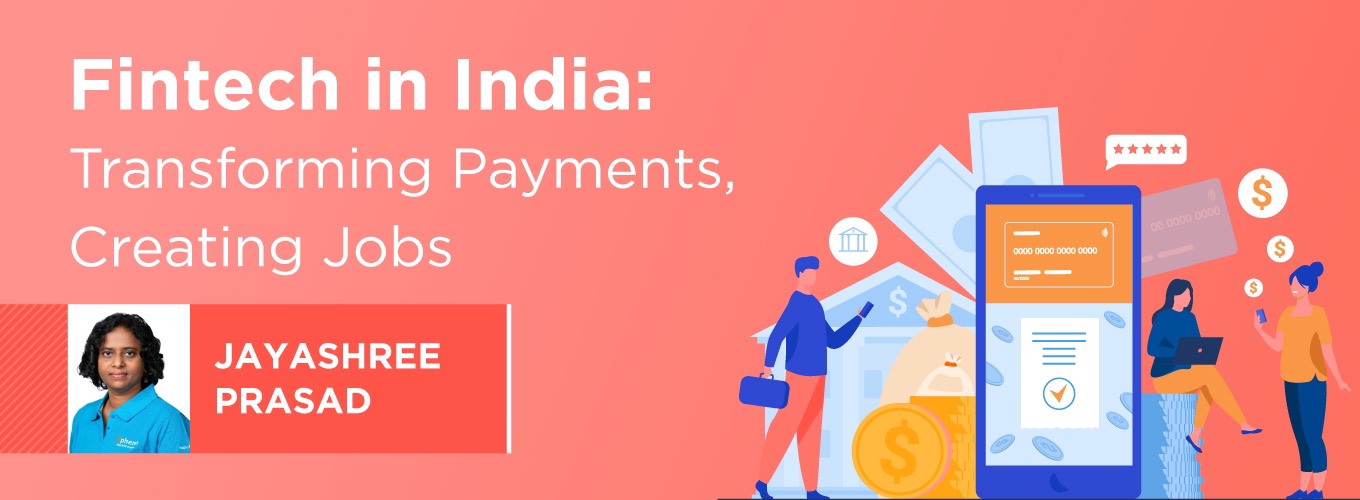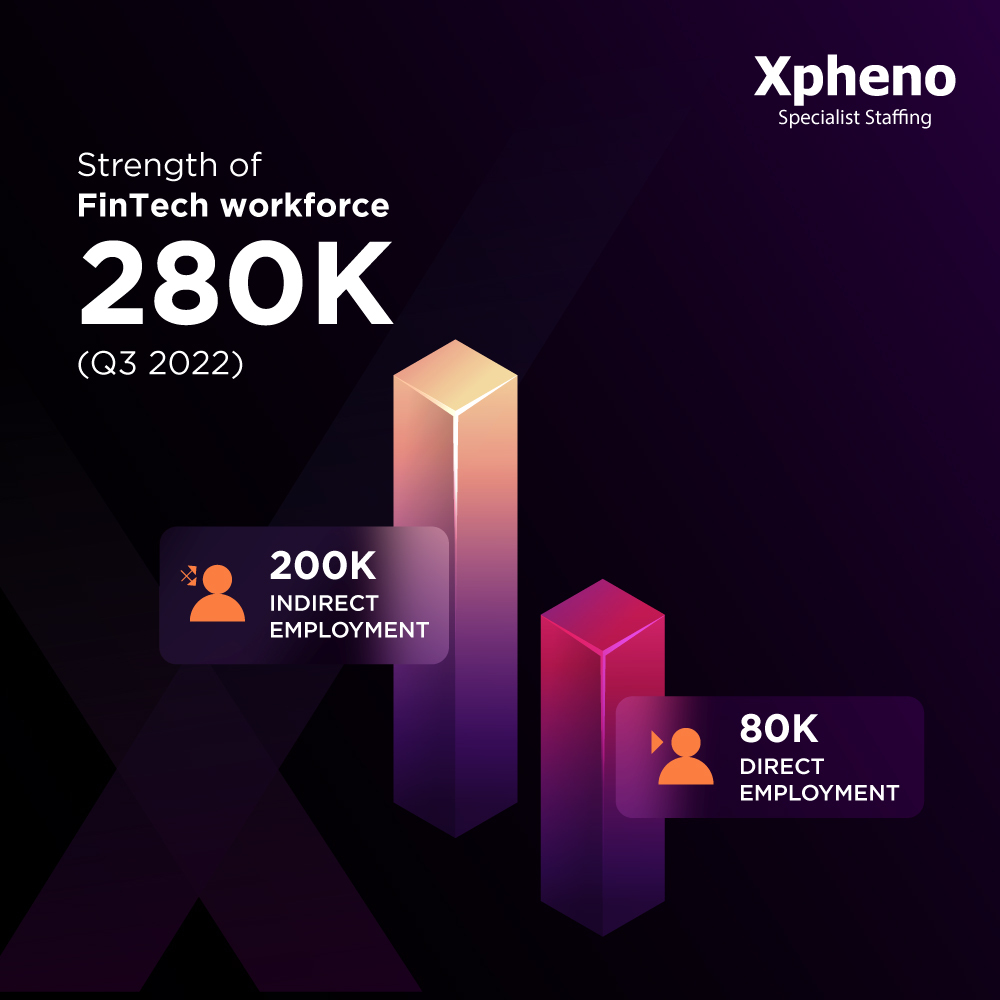Fintech in India: Transforming Payments, Creating Jobs
Until a few years ago, just imagine leaving home without a wallet. I remember it used to be stressful and annoying, often having to return home to pick up the wallet, while I got delayed to the office; and on days I realized only after reaching the office, I went through the awkwardness of having to borrow from colleagues/friends at work.
But today, it’s perfectly ok to leave home without a wallet, thanks to the sense of freedom and assurance created by Fintech payment processing companies through their mobile apps. Well, funnily, I don’t really seem to forget my phone. Perhaps my cell phone seems like an extension of me. Remember HSBC’s famous tagline, the world in your wallet? Well, the wallet sounds passé and seems to be losing its sheen (if it already has not) and distinctly the world (including my wallet) is in my phone.
In India, Digital disruption, in recent times, has been most visible in the financial services space. Catalyzed by Demonetisation and Covid lockdowns, India accelerated its digital shift to adopt and utilize fintech products for their accessibility and convenience. Fintech Payment apps allow for person-to-person payments in addition to enabling small business transactions. According to a BCG report, the industry is estimated to reach a valuation of up to $150 billion by 2025. One should only expect to see more players in this space simply because of the sheer market potential and opportunity size.
In this post, let’s understand how fintech is revolutionizing payments and driving job growth in the country. We look at the top drivers of fintech growth and also discuss the impact of these innovative fintech payment solutions and what the future holds for upcoming ventures and talent in this industry.
- Fintech Payment Solutions Technology (PayTech): The Indian Drivers
- The Current Fintech Payment Landscape
- Growth prospects in Urban and Rural India:
- Fintech companies bringing mobile money to the masses
- Fintech – Job creation – Tech and Non-Tech roles:
- The Fintech Bottomline:
Fintech Payment Solutions Technology (PayTech): The Indian drivers
At midnight of November 8, 2016, India took a drastic intervention and removed the legal tender status of banknotes of ₹500 and ₹1,000, an event which made words like ‘demonetization’ or ‘notebandi’ become commonplace parlance. Cash, the most convenient form of money, found itself in a precarious situation. As the supply of money would get disrupted, transactions would get reduced, which meant that economic activity in India was going to slow down, and perhaps it would have a disastrous impact on businesses and livelihoods.
However, consumers and firms found a simple, convenient and secure way to continue transacting through payment solutions apps. The digital currency began to thrive and the situation provided a great lift to Fintech companies providing payment solutions. Soon the products not only multiplied but expanded in scope to include direct bank transfer, scan and pay, and Buy Now Pay Later to power and fundamentally alter and transform our cash-dominant economy.
Needless to say, smartphones with over 600 mobile internet users base, have played a massive role in enabling this transformation. Some companies went beyond the affordability constraint of smartphones to include the humble feature phone and its users in the digital journey, with exclusive solutions.
4 years later, COVID- 19 became the second moment of crisis that pushed the Indian masses to further adopt new ways of making & receiving payments, transferring money, and managing their finances digitally, as ATM visits became impossible. “Contactless” became the keyword underlying many businesses, consumers, and individual financial transactions.
Government initiatives further made it easier for fintech companies to comply with regulations and provide financial services to a wider range of people. Some of the initiatives promoting fintech growth in India include Jan Dhan Yojana, Aadhar, and the Unified Payment interface. Together, they have helped establish a regulatory framework for digital payments and improve the investment inflows for fintech startups. This has created a favorable environment for fintech payment companies to thrive and innovate.
The Current Fintech Payment Landscape
The digital payment infrastructure in India is now driven by a range of fintech enterprises that are offering innovative solutions for the diverse needs of businesses and consumers. Paytm, PhonePe, and Mobikwik are some of the leading payment companies in the country that enable one-click payment for consumers and merchants. For consumers it enables utility bill payments, mobile and DTH recharges as well as Peer-to-peer payments via UPI. For merchants, they enable digital payment and easy bookkeeping of transactions record.
Other notable Paytech startups like Razorpay, Instamojo, Mswipe, and Cashfree offer payment devices, software solutions, and other business management services to Indian startups and SMEs.
New-age Fintech players are using cutting-edge tech to open up new opportunities for growth and innovation. Recko is a platform that automates payments reconciliation for enterprises. It uses artificial intelligence to track and analyze financial data to ensure transparency and authenticity in digital transactions. Epay Later offers instant credit for business purchase requirements of small businesses and merchants. As mobile cash becomes the preferred method of payment in India, these fintech companies are well-positioned to lead the way in this rapidly evolving market.
Growth prospects across India
India has a large and rapidly growing digital population. While urban demand is growing, fintech companies are still unlocking the value hidden in rural markets with simpler, accessible user interfaces and vernacular modes. Some strategic/tactical approaches adopted by these companies are:
- Encouraging the usage of mobile wallets and digital payment platforms to make purchases and pay bills, especially utility bills, and projecting convenience and security of these transactions.
- Enabling tracking of spending to better financial management and planning.
- Owing to tight competition for customer acquisition and retention, Paytech companies will continue to bank on and promote Cashbacks, offers, and loyalty points to capture the digital payments market share pie, which also benefits customers with marginal cash flow advantages.
- In order to enable digitalization in rural India technological innovations which do not require an internet connection such as the RBI’s UPI 123Pay initiative enables low-cost and low-ticket-size transactions that are typically accessed through SMS and OTP modalities.
Fintech companies – Bringing mobile money to the masses:
Mobile Money is essentially an electronic wallet service that is a popular alternative to bank accounts, where one can store, send and receive money through their mobile phone. The technology is highly intuitive from a user perspective and promotes easy navigation and does not warrant much training. Here are some features that add to the charm of Fintech payment solutions:
UPI
UPI has been majorly successful in enabling online payment in India. The accessibility has allowed it to onboard right from big players to local Kirana stores as well as consumers on digital payment platforms, so much so that Paytming and Gpaying are now colloquial terms for paying and making refunds.
Security
In addition to their user-friendly interfaces, fintech payment companies in India have also focused on providing secure payment solutions. These companies use cutting-edge technology, such as encryption and biometric authentication, to ensure that users’ personal and financial data is protected. This has helped bridge the trust deficit among consumers.
e-Commerce
We have come a long way in the past 5 years. Currently, fintech payment solutions are not only giving easier transaction options but creating better checkout experiences for businesses going digital. e-Commerce platforms set by enterprises give the convenience of a one-stop shop for website management and one-click checkout for their customers.
Fintech Job Creation – Tech and Non-Tech Roles
Fintech companies in India are using cutting-edge technologies like blockchain and artificial intelligence to make payments faster, cheaper, and more secure. Besides improving customer experience, these innovations are powering massive career opportunities in data sciences, data analytics, AI/ML, UI/UX, cyber security, governance, risk & compliance, in addition to huge opportunities in non-tech roles such as process excellence, Sales, customer growth, customer success, customer onboarding, customer support, and back office roles.
These opportunities are across the spectrum of Fintech companies that are into blockchain, cryptocurrency, Insurance technology (InsurTech), regulatory technology (RegTech), Lending Technology (LendingTech), Payments Tech (PayTech), Mobile Payments, Trading Technology (TradeTech), Personal Finance (WealthTech), Consumer Banking (BankTech), equity financing and more.
Data from our research at Xpheno suggests that the top 125 fintech companies in India directly employ 80,000 people, and their activities also indirectly generate employment for an additional 2.5 times that number. Till July 2022, there were over 4,200 active fintech start-ups in India, with over 500 of them being funded.
With most of these ventures still in their early stages, the total estimated employment generated by the fintech sector in India is over 1.8 million. These numbers demonstrate the significant impact that fintech is having on the Indian economy by creating job opportunities in a range of industries.
Some of the job buckets noting major growth in demand in the Fintech sector in 2022 include Software Development, Data Science, Product Management, Business Development, and Marketing.
The Fintech Bottomline
New-age Fintech Payment solutions companies will continue to emerge and push the envelope to explore uncharted territories and create new possibilities for the economy. Currently, the Paytech ventures are focussed on bringing inclusivity, bridging the digital divide, and unlocking potential marketplaces in India. With its innovative solutions and commitment to security, Paytech is poised to continue its growth and success in the years ahead.












